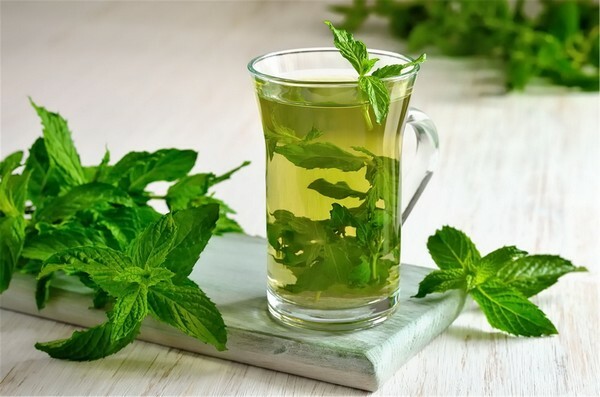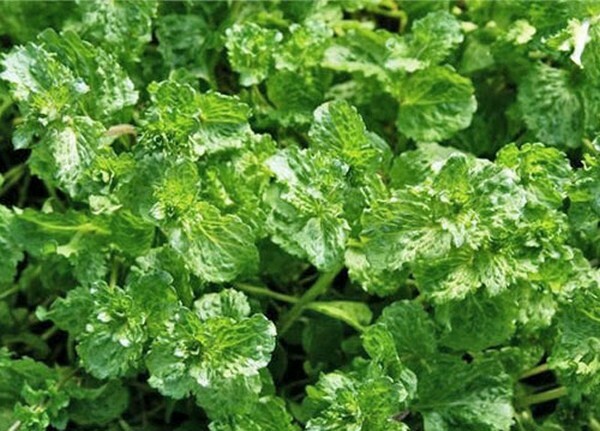During lactation pediatricians recommend that women exclude from the diet many drinks - lemonades, green and black tea, coffee. Under the ban are all the infusions of medicinal herbs, including fragrant peppermint. Despite the fact that the plant contains a huge number of useful compounds, it contains bioactive substances that can harm the health of the mother and child. Peppermint during breastfeeding can provoke an acute allergic reaction in the baby, for the elimination of which you will need to take pharmacological preparations. For a fragrant plant, the features of the application, on which milk production depends on the young mother, are also characteristic.

Mint during lactation
Pediatricians on the parents' question about whether mint during breastfeeding respond only negatively. The plant contains a high concentration of essential oil, bitter, tannin, which often causes the development of nausea, vomiting, headaches, even in an adult with good health. All active substances of their chemical composition of peppermint easily penetrate many biological barriers of the human body. After 1-2 hours after consuming a woman breast-feeding mint tea, essential oil accumulates in breast milk, from where it enters the digestive tract of the baby.
Warning: Fresh mint leaves contain the most bioactive compounds. And in the dry plant raw materials are concentrated many tannins - tannins, capable of provoking an allergy, both in the mother and in the baby.
Many nursing mothers are surprised at the categorical ban on the use of peppermint during lactation, because in the pharmacy in a wide range of packaged teas with this plant, designed for babies from 6 months. But there is no contradiction here. The fact is that the composition of teas is adapted to the still not completely formed gastrointestinal tract of the child:
- the amount of ethereal mint oil, including its main ingredient menthol, is minimized;
- added useful compounds that improve digestion and peristalsis of the baby.
These herbal teas are used as a mild sedative and antispasmodic agent with excessive gas production and sleep disorders in children. Mint effectively copes with colic, provoking severe pain in the tummy. Children's tea helps the baby to sleep peacefully throughout the night.
Benefits of
If a woman has a desire to drink tea with mint while breastfeeding, you can significantly reduce the content of essential oil in it. To do this, 2-3 times scald the fresh leaves with boiling water, and then rinse in cold water. This method of heat treatment lowers the concentrations of menthol in plant raw materials. It should also be taken into account that you can not put more than one sheet of fresh mint on a cup of boiling water, and it is better not to use dry grass at all. Undoubtedly, the medicinal plant has a positive effect on the woman weakened by the birth:
- eliminates psychoemotional instability;
- returns mental and physical performance;
- corrects the hormonal background;
- increases the functional activity of the gastrointestinal tract;
- normalizes the functioning of the liver and gallbladder.
Nursing women are not recommended for many antibacterial and antiviral agents that penetrate into breast milk. Biologically active substances from the composition of mint prevent respiratory and intestinal infections due to their antimicrobial, antiseptic and anti-inflammatory action. The main thing is to follow the dosing regimen and do not drink flavored tea more than once a week.

allergy. Harm
Menthol, contained in essential oil, has a multifaceted impact on the amount of milk produced. It all depends on the frequency of use of drinks, the general health of women and the concentration of active ingredients in them. How Mint Affects Lactation:
- if a young mother has lost milk due to stress or food poisoning, the use of a single dose of mint tea will enhance lactation. Under the influence of menthol, large and small blood vessels expand. Improving blood circulation helps to fill the breast with milk;
- with frequent use of mint tea( more than 2 times a week) in the body begins to produce more mucous substances. The quantity and quality of breast milk is significantly reduced, and after a while lactation completely stops.
The ability of menthol to stop the production of milk is actively used by women. Mint is a part of the fees for stopping lactation along with sage, elephant, and Ledum.
Tip: Milk is no longer produced by the body after daily consumption of 2-3 cups of vegetable tea for a week. It is very important at this time to completely stop breastfeeding.
Peppermint with HB has a negative effect on the mother and child. As a result of the expansion of blood vessels, blood pressure is significantly lowered and heart rate is slowed. Such a state is dangerous by dizziness, disturbance of balance and falling. At the kid in a gastrointestinal tract while there are not enough digestive enzymes for splitting of high concentration of an essential oil. Therefore, babies can have diarrhea, flatulence, bloating.

. Curly mint.
. The broad family of Jasnotkovka includes mint curly. From the pepper variety it is distinguished by the absence in the chemical composition of a large amount of menthol. Mint curly does not have a pronounced aroma, but it contains a lot of carvone - a natural substance from the family of terpenoids. It is because of this biologically active compound that pediatricians recommend that nursing women drink decoctions of fennel and dill seeds, which ensure a rapid inflow of milk. For a useful plant is characterized by a multifaceted impact on the mother and child:
- increased appetite;
- excretion of slag and toxic compounds from the body;
- prophylaxis of bacterial, viral and fungal infections;
- elimination of diarrheal disorders, including increased gas production;
- decrease in the severity of pain of any origin and localization.
Curly mint in lactation helps to eliminate swelling and even to stop inflammation. It is very easy to make healthy tea. It should be a couple of fresh leaves pour a glass of boiling water and press under the lid for half an hour. To increase lactation you need to consume 200 ml of the drink daily.
Important: If, after eating a mint tea on the baby's skin, reddening and rashes appear, then you should stop the drink throughout the lactation period.
